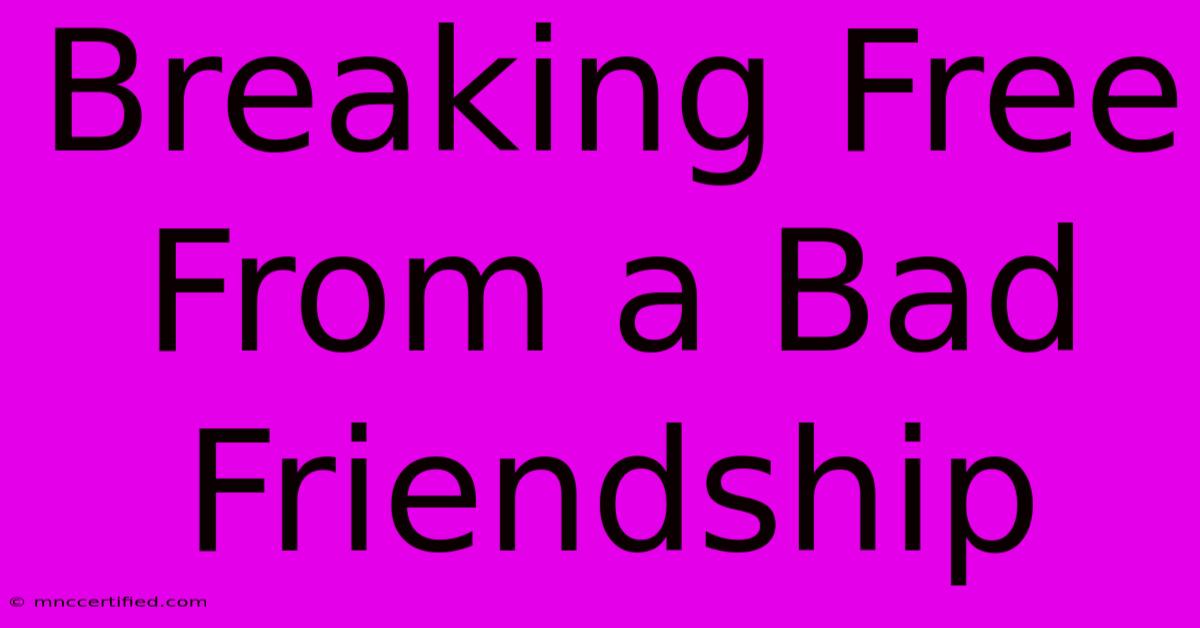Breaking Free From A Bad Friendship

Table of Contents
Breaking Free From a Bad Friendship: How to Recognize Toxic Relationships and Reclaim Your Well-being
Maintaining healthy relationships is crucial for our well-being. However, sometimes we find ourselves entangled in friendships that drain our energy and negatively impact our mental health. Recognizing and breaking free from a bad friendship can be challenging, but it's a necessary step towards reclaiming your happiness and self-respect. This article will guide you through the process of identifying toxic friendships, developing strategies for disengagement, and nurturing healthier connections.
Identifying the Signs of a Toxic Friendship
Before you can break free, you need to identify the warning signs of a bad friendship. These relationships often involve:
-
Constant Negativity: Does your friend frequently complain, criticize, or gossip? Do you feel drained after spending time with them? Consistent negativity is a major red flag.
-
One-Sided Relationship: Are you constantly giving and rarely receiving? Do you feel like you're the only one putting effort into maintaining the friendship? A healthy relationship involves reciprocity.
-
Lack of Respect: Does your friend disrespect your boundaries, opinions, or feelings? Do they dismiss your concerns or try to control your actions? Respect is paramount in any healthy relationship.
-
Jealousy and Competition: Does your friend constantly compare themselves to you or try to undermine your achievements? Healthy friendships celebrate each other's successes.
-
Manipulation and Guilt Trips: Does your friend use guilt or manipulation to get what they want? This is a sign of an unhealthy dynamic.
-
Disrespect of your time: Do you constantly feel rushed, unheard, or disregarded in conversations with this friend? Does your time feel less valuable than theirs?
Strategies for Disengaging from a Toxic Friendship
Once you've identified a toxic friendship, taking steps to disengage can feel daunting. Here's a phased approach:
1. Reduce Contact Gradually:
Don't abruptly cut off contact, as this can sometimes escalate the situation. Start by slowly reducing the frequency of your interactions. Decline invitations, respond to messages less frequently, and shorten your conversations.
2. Set Boundaries:
Clearly communicate your boundaries to your friend. This might involve saying no to certain requests or activities that drain you. Be assertive but respectful. For example, you could say, "I'm not comfortable discussing that topic," or "I need some time for myself."
3. Limit Sharing Personal Information:
Avoid sharing personal details or vulnerabilities with your friend. This reduces their ability to manipulate or control you.
4. Prepare for Potential Conflict:
Be prepared for your friend to react negatively to your distancing. They might try to guilt you, manipulate you, or even become angry. Remember that their reaction doesn't reflect your worth.
5. Accept the End of the Friendship:
Sometimes, the only solution is to end the friendship completely. This can be painful, but it's often necessary for your well-being. You might need to have a final conversation to clearly communicate your decision. However, be prepared to limit contact even if the conversation doesn't resolve everything.
Reclaiming Your Well-being After Breaking Free
Breaking free from a toxic friendship can be liberating, but it also requires time and self-care. Focus on:
-
Self-Reflection: Take time to reflect on the relationship and what you learned from it. Identify your needs and boundaries.
-
Self-Care: Prioritize activities that nurture your physical and mental health. This might include exercise, meditation, spending time in nature, or pursuing hobbies.
-
Building Healthy Relationships: Focus on nurturing existing healthy relationships and cultivating new ones with people who value and respect you.
Remember: Breaking free from a bad friendship is a sign of strength, not weakness. It's an essential step towards creating a happier and healthier life. Prioritize your well-being, and don't hesitate to seek support from friends, family, or a therapist if needed. You deserve to surround yourself with people who uplift and support you.

Thank you for visiting our website wich cover about Breaking Free From A Bad Friendship. We hope the information provided has been useful to you. Feel free to contact us if you have any questions or need further assistance. See you next time and dont miss to bookmark.
Featured Posts
-
Pinstripe Bowl 2024 Boston College Vs Nebraska Betting
Dec 29, 2024
-
Byu Cougars Vs Colorado Buffaloes Preview
Dec 29, 2024
-
Magnus Carlsen Exits Rapid Blitz Championships
Dec 29, 2024
-
Predicting Miami Vs Iowa State Football Score
Dec 29, 2024
-
Korea Plane Crash Atc Bird Alert
Dec 29, 2024